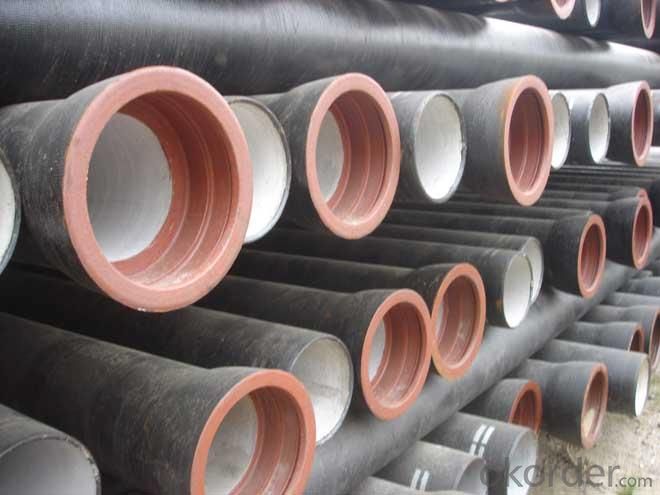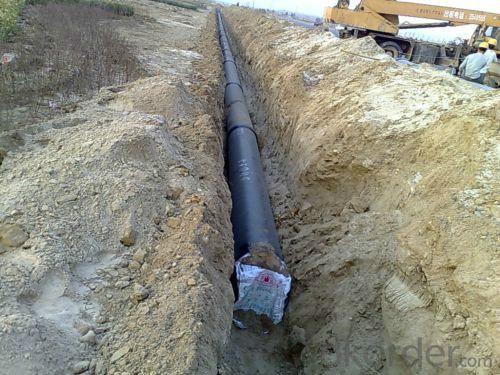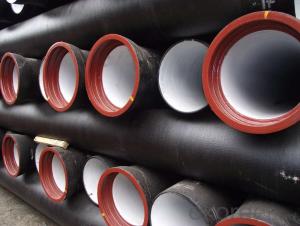Ductile Iron Pipe C40 DN300-DN900 ISO2531 for Water Supply
- Loading Port:
- China main port
- Payment Terms:
- TT or LC
- Min Order Qty:
- 20 m.t.
- Supply Capability:
- 200000 m.t./month
OKorder Service Pledge
OKorder Financial Service
You Might Also Like
1,Ductile Iron Pipe Description :
Ductile Iron pipe are manufactured according to ISO 2531 or BS EN545 or BS4772 FOR POTABLE WATER ,internal is cement lining or wet epoxy coating;External is zinc plus bitumen or wet epoxy coating. We also manufacture ductile iron fittings with fusion bonded epoxy both inside and outside. All the producets are sutible to water pipes fields.
1) Pipes confirm to ISO2531,K9 class,T type joint,6m long,with inside cements lining conform to ISO4179, outside Zinc spraying(130g/m2) and bitumen coating(70μm) conform to ISO8179.
2) Pipe ends: Spigot and socket ends, with 100% SBR rubber gaskets
accoding to ISO4633
3) we can do third party inspection according to customer's request.
4) Our products have been sold to many international market,
such as Middle East and South East Asia and Africa.
2,Main Features of the Ductile Iron Pipe:
·High yield strength
·High tensile Strength
·High corrosion resistance
·Pressure Resistence
·Anti-corrosion
·Installation is convenient
·Satisfy the highest hygienic standards
. Internal Lining: Cement, conform to ISO4179
. External coating: Zinc + Bitumen, conform to ISO8179
. Rubber: NBR, SBR, EPDM according to ISO4633 / EN681.1
. Note: The gaskets, bolts & nuts are supplied respectively as your special requirement
3,Ductile Iron Pipe Images:


4. Ductile Iron Pipe Specification
Surface Finishes:Bare, Oiled, Mill Varnish, Galv,FBE, FBE Dual, 3LPE, 3LPP, Coal Tar,Concrete Coating and Tape Wrap
End Finishes: Beveled, Square Cut, Threaded, hat
Additional Services: Internal Coating
Packaging: packed in bag, plastic bag, steel strip, steel wire,double wire, iron box, wooden box,
tarpaulin, plastic sheeting
Test :X-ray, UT, magnetic particle,inspection,hydrostatic test.
Processing service :Beveling, Threading, Slotting, Cut-to length, Bends, Quench and Temper, Fabrication, Double-jointing and On-site assistance
Documentary MTC: material certification,Origin certification, CI or PI,Test Report, export licence, handling order, B/L,insurance policy,shipping instructions, contract, packing list etc.
5.FAQ:
We have organized several common questions for our clients,may help you sincerely:
1.Q: Why would you choose ductile iron pipe rather than other pipe materials?
A:The reasons are obvious for that not only ductile iron pipe possesses the inherent strength and flexibility of ductile iron, combined with proven corrosion protection systems, but also the cost savings can be achieved from design to installation and commissioning.
2.Q:Why can you guarantee the inner of pipes can’t be corroded?
A: High alumina cement mortar lining and sulphate-resistant cement mortar lining. These two special linings are applicable to inner anti-corrosion for sewage pipes, improving resistance to erosion of the sewage components.
- Q:Can ductile iron pipes be used for water distribution networks in rural areas?
- Yes, ductile iron pipes can be used for water distribution networks in rural areas. Ductile iron pipes are known for their high strength and durability, making them suitable for various applications, including water distribution. They have excellent resistance to external loads and pressure, making them ideal for underground installations. In rural areas where the water distribution network may be subjected to harsh environmental conditions or agricultural activities, ductile iron pipes can withstand external forces and resist corrosion better than other materials. They are also less prone to cracking or leaking, ensuring a reliable water supply for rural communities. Moreover, ductile iron pipes have a long service life, often exceeding 100 years. This makes them a cost-effective choice for rural water distribution networks, as they require minimal maintenance and replacement over time. However, it is important to consider other factors such as the availability of ductile iron pipes in the area, the cost of installation, and the technical expertise required for their installation and maintenance. Additionally, local regulations and standards should be followed to ensure compliance and safety. Overall, ductile iron pipes can be a suitable and reliable option for water distribution networks in rural areas, providing a long-lasting and efficient solution for delivering clean water to communities.
- Q:Ductile iron pipe in the direction of it?
- The use of cast iron by adding more than 18 nodularizer, after centrifugal ductile cast iron machine high speed centrifugal cast pipe, called "ductile" (Ductile Cast Iron Pipes), referred to as ball pipe, ductile iron pipe and ductile iron pipe etc..
- Q:Can ductile iron pipe be used for bridge crossings?
- Yes, ductile iron pipe can be used for bridge crossings.
- Q:Can ductile iron pipes be used for underground sewage systems?
- Underground sewage systems can utilize ductile iron pipes, which offer numerous advantages. Ductile iron is a form of cast iron that possesses improved flexibility and strength, making it suitable for a variety of applications, including sewage systems. The first advantage of ductile iron pipes for underground sewage systems is their exceptional resistance to corrosion. This is particularly important in sewage systems where moisture and chemicals can contribute to corrosion over time. By resisting corrosion, these pipes ensure long-term durability and reliability. Additionally, ductile iron pipes possess high tensile strength, enabling them to withstand the pressure and stress that occur in underground sewage systems. They are also capable of withstanding ground movements, such as soil settling or shifting, which can cause damage to pipes made from other materials. Moreover, ductile iron pipes have a smooth internal surface, resulting in improved flow capacity and reducing the likelihood of clogging or blockages in the sewage system. This smooth surface also minimizes the accumulation of debris and sediment, lessening the need for frequent maintenance and cleaning. Another significant aspect is that ductile iron pipes are available in various sizes and can be easily connected using a range of joint systems. This allows for flexibility when designing and constructing underground sewage systems. In conclusion, ductile iron pipes are an excellent choice for underground sewage systems due to their corrosion resistance, high tensile strength, smooth internal surface, and ease of installation.
- Q:Can ductile iron pipes be used for slurry transportation?
- Yes, ductile iron pipes can be used for slurry transportation. Ductile iron pipes are known for their strength and durability, which makes them suitable for transporting various types of fluids, including slurry. They have the ability to withstand the abrasive nature of slurry and can effectively handle the pressure and flow requirements associated with slurry transportation.
- Q:Are ductile iron pipes resistant to chemicals?
- Yes, ductile iron pipes are highly resistant to a wide range of chemicals, making them suitable for various applications involving corrosive substances.
- Q:How are ductile iron pipes joined to fittings and valves?
- Ductile iron pipes are typically joined to fittings and valves using mechanical joint or push-on joint methods. The mechanical joint involves using a gland and a rubber gasket to create a tight seal when the pipe is bolted to the fitting or valve. On the other hand, push-on joint method uses a rubber gasket that is compressed when the pipe is pushed into the fitting or valve, providing a secure connection without the need for bolts or additional hardware.
- Q:How can 4 inch ductile iron pipe be connected with 2 inch galvanized pipe?
- The general electric welded steel pipe for clarinet.
- Q:What are the typical bedding and backfill requirements for ductile iron pipes?
- To ensure the correct installation and long-term effectiveness of ductile iron pipes, it is important to adhere to the typical requirements for bedding and backfill. The bedding material should be a granular substance that provides support and evenly distributes the load on the pipe. Suitable materials include sand, gravel, or crushed stone. The bedding material should be placed uniformly and continuously along the bottom of the trench, with a minimum thickness of 6 inches. The width of the bedding layer should be at least 1.5 times the outer diameter of the pipe, or as specified by the pipe manufacturer. Once the bedding is in place, the remaining space around the pipe should be filled with backfill material. This material should also be granular and free from large stones, debris, or organic matter. It should be compacted in 6-inch increments using appropriate compaction equipment. The backfill should be evenly distributed around the pipe, ensuring there are no gaps or voids. Excessive compaction should be avoided to prevent damage or deformation of the pipe. The backfill material should extend at least 12 inches above the top of the pipe. In addition to following the bedding and backfill requirements, it is crucial to adhere to any specific guidelines provided by the pipe manufacturer. These guidelines may include recommendations for specific materials, compaction methods, or additional protective measures. Overall, proper bedding and backfilling of ductile iron pipes are essential for maintaining the structural integrity and preventing damage or failure. By following industry standards and manufacturer specifications, the pipes will perform effectively and last for a long time in various applications.
- Q:What are the common causes of failure in ductile iron pipes?
- The common causes of failure in ductile iron pipes include corrosion, external loading, ground movement, manufacturing defects, and improper installation or maintenance.
1. Manufacturer Overview |
|
|---|---|
| Location | |
| Year Established | |
| Annual Output Value | |
| Main Markets | |
| Company Certifications | |
2. Manufacturer Certificates |
|
|---|---|
| a) Certification Name | |
| Range | |
| Reference | |
| Validity Period | |
3. Manufacturer Capability |
|
|---|---|
| a)Trade Capacity | |
| Nearest Port | |
| Export Percentage | |
| No.of Employees in Trade Department | |
| Language Spoken: | |
| b)Factory Information | |
| Factory Size: | |
| No. of Production Lines | |
| Contract Manufacturing | |
| Product Price Range | |
Send your message to us
Ductile Iron Pipe C40 DN300-DN900 ISO2531 for Water Supply
- Loading Port:
- China main port
- Payment Terms:
- TT or LC
- Min Order Qty:
- 20 m.t.
- Supply Capability:
- 200000 m.t./month
OKorder Service Pledge
OKorder Financial Service
Similar products
New products
Hot products
Related keywords



























